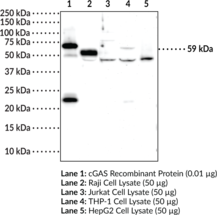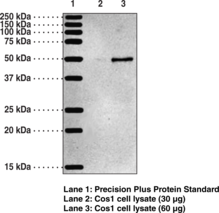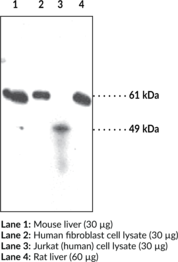Description
Cyclic GMP-AMP (cGAMP) synthase (cGAS; Item No. 22810) is a nucleotidyltransferase located in the cytosol that acts as a cytosolic DNA sensor to detect foreign DNA from microbial pathogens as part of the innate immune response.{22400,22401} Upon binding to cytosolic DNA, cGAS produces the cyclic dinucleotide second messenger cGAMP, which activates stimulator of interferon genes (STING), leading to activation of the type I interferon (IFN) pathway.{22400,22401,39161} In vitro, fibroblasts, macrophages, and dendritic cells isolated from cGAS knockout (cGAS-/-) mice do not produce type I IFNs following DNA transfection or DNA virus infection.{39163} Similarly, cells containing a frame-shift mutation in the cGAS locus fail to mount an immune response to HIV and other retroviruses.{39164} In vivo, cGAS-/- mice infected with herpes simplex virus 1 (HSV-1) have lower levels of IFN-α and IFN-β, shorter survival times, and higher post-mortem levels of HSV-1 in the brain.{39163} Cayman’s cGAS Monoclonal Antibody (Clone 5G10) recognizes the full length human cGAS protein at ~59 kDa.
Synonyms: C6orf150|cGAMP synthase|Cyclic GMP-AMP synthase|h-cGAS|Mab-21 domain-containing protein 1|MB21D1
Immunogen: Full length human recombinant protein
Formulation: 300 µg of protein G-purified IgG
Isotype: IgG2A
Applications: IF, IP, and WB
Origin:
Stability: 365 days
Application|Immunofluorescence||Application|Immunoprecipitation||Application|Western Blot||Product Type|Antibodies|Monoclonal Antibodies||Research Area|Cell Biology|Cell Signaling|cAMP Signaling||Research Area|Immunology & Inflammation|Autoimmunity||Research Area|Immunology & Inflammation|Innate Immunity|Pattern Recognition||Research Area|Immunology & Inflammation|Innate Immunity|STING||Research Area|Infectious Disease|Viral Diseases|HIV & AIDS||Research Area|Infectious Disease|Viral Diseases|HSV



